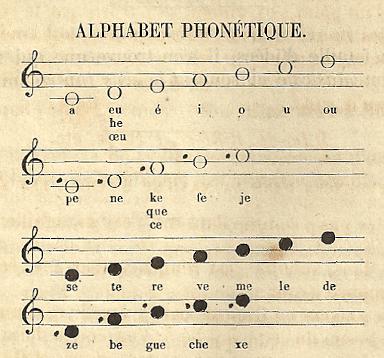Solrésol has had somewhat of a revival in recent years, due at least partially to a popular article by Paul Collins.
The system is an early attempt at an auxiliary artificial language, developed by François Sudre in the 19th century, and based on the seven notes of the diatonic scale. He spoke it with solfeggio syllables, and wrote it on a three-line staff. It could also be used as a manual language for the deaf, by assigning the seven notes to places on the hand.
There is some material on Solrésol on the internet, but there are some notable omissions, due to the rarity of the original source material. I have a copy (in very bad condition) of Sudre’s 1866 edition, which I discovered in a used bookstore a few years ago. Sudre’s method for spelling names seems to be unavailable, so I’ll post it here.
The “Phonetic Alphabet” was to be used for “proper names, names of cities, names of streets, and technical terms.” Black notes are repeated: M, for example, is pronounced sol-sol. Notes preceded by a point are accented (“with a rinforzando“). Black notes with a point are repeated, and the accent placed on the first syllable. He also stipulated that all words are to be spelled phonetically: a double s is spelled as a single, “au” is spelled “o,” etc. This seems to me an unnecessary complication; many English names don’t break down easily into French phonemes, for example. But there you have it, in all its Sudresque beauty.
(Posted by Doug Skinner)



2 responses so far ↓
1 Bill Chapman // Aug 27, 2011 at 1:04 pm
Very ingenious, but it’s clear that Esperanto was the only successful auxiliary artificial language. I’d like to add the people can learn Esperanto on http://www.lernu.net
Oh, and I’d like to point out that there are a lot of Esperanto books on eBay at present.
2 name A Musical Cipher // Oct 28, 2013 at 11:31 am
[…] course, you could also just use the wonderful musical language Solrésol. It’s nice to have […]